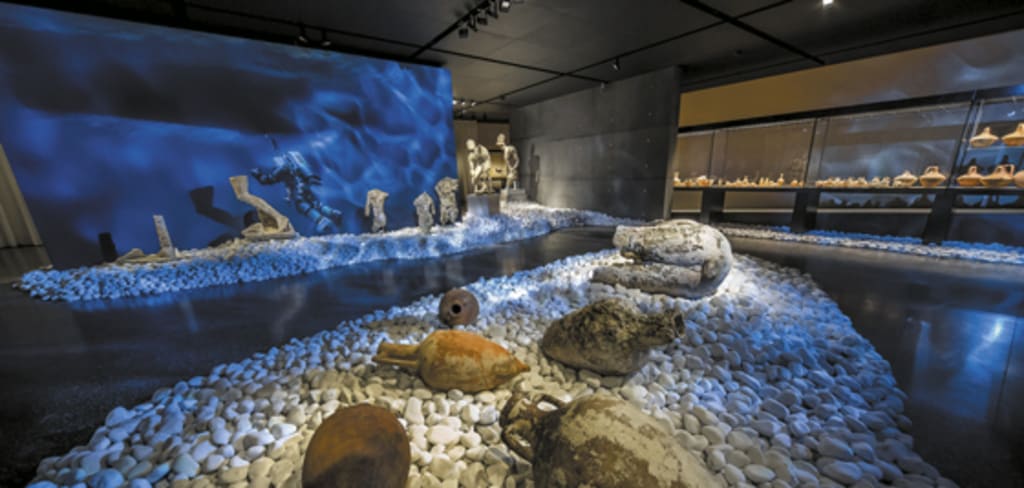Greek Antikythera Shipwreck: Unveiling Ancient Maritime and Technological Mastery
History

The Greek Antikythera Shipwreck, discovered in 1900 by sponge divers off the coast of the island of Antikythera, remains one of the most significant underwater archaeological finds of the 20th century. This ancient shipwreck has yielded a treasure trove of artifacts, providing invaluable insights into ancient Greek technology, trade, and daily life. Among its many remarkable discoveries, the most famous is the Antikythera Mechanism, a sophisticated ancient analog computer that has revolutionized our understanding of Greek scientific knowledge and engineering prowess.
The shipwreck dates back to around the 1st century BC, during the Hellenistic period, a time when Greek culture and influence were at their zenith. The cargo of the ship, believed to have been en route from the eastern Mediterranean to Rome, included a wide array of artifacts such as statues, pottery, glassware, and jewelry. These items reflect the wealth and cultural sophistication of the period, offering a snapshot of the extensive trade networks that connected various parts of the ancient world. The diversity and quality of the artifacts found at the site highlight the importance of trade in spreading artistic and technological innovations across the Mediterranean.
The most extraordinary find from the Antikythera Shipwreck is undoubtedly the Antikythera Mechanism. This intricate device, often considered the world's first known analog computer, was used to predict astronomical positions and eclipses for calendrical and astrological purposes. The mechanism consists of a complex system of gears and dials, encased in a wooden box, and is inscribed with ancient Greek text. Its ability to track the cycles of the solar system, including the movements of the sun, moon, and five known planets, demonstrates an advanced understanding of astronomy and mathematics that was previously unrecognized in ancient Greek technology.
The Antikythera Mechanism has profoundly impacted our perception of ancient Greek science and engineering. Detailed analysis and modern imaging techniques have revealed the device's sophisticated construction and intricate gearing system, showcasing the Greeks' mastery of mechanical engineering. The mechanism's design indicates that ancient Greek scientists possessed a level of technical skill and theoretical knowledge that rivals modern engineering. This discovery has prompted historians to reevaluate the technological capabilities of the ancient world and acknowledge the Greeks' contributions to the development of complex machinery.
In addition to the Antikythera Mechanism, the shipwreck has provided numerous other artifacts that offer insights into the daily lives and practices of ancient Greeks. Statues of deities and notable figures, intricately designed glassware, and finely crafted jewelry all point to the high level of artistry and craftsmanship prevalent in Hellenistic Greece. These items also reflect the cultural and religious practices of the time, shedding light on the values and beliefs that shaped ancient Greek society.
The discovery and study of the Antikythera Shipwreck have significantly advanced the field of underwater archaeology. The site has become a model for the meticulous excavation and preservation of underwater artifacts, demonstrating the potential for submerged sites to transform our understanding of ancient history. The ongoing exploration and research at Antikythera continue to yield new discoveries, contributing to our knowledge of ancient maritime trade, technology, and daily life.
The artifacts recovered from the Antikythera Shipwreck, including the Antikythera Mechanism, are now housed in the National Archaeological Museum of Athens, where they continue to captivate and educate visitors from around the world. These exhibits provide a tangible connection to the past, allowing contemporary audiences to appreciate the ingenuity and creativity of the ancient Greeks. The shipwreck and its treasures serve as a powerful reminder of the enduring legacy of Greek civilization and its profound impact on the development of science, technology, and culture.
In conclusion, the Greek Antikythera Shipwreck stands as a monumental archaeological discovery that has significantly enriched our understanding of ancient Greek civilization. The extraordinary artifacts recovered from the site, particularly the Antikythera Mechanism, highlight the advanced technological and scientific knowledge of the Greeks. This ancient shipwreck continues to fascinate and inform, offering invaluable insights into the complexities of ancient maritime trade, daily life, and technological innovation. Its enduring legacy underscores the remarkable achievements of the ancient Greeks and their lasting influence on the course of human history.
About the Creator
Marveline Merab
“History never repeats itself. Man always does.”
― Voltaire
Enjoyed the story? Support the Creator.
Subscribe for free to receive all their stories in your feed. You could also pledge your support or give them a one-off tip, letting them know you appreciate their work.






Comments
There are no comments for this story
Be the first to respond and start the conversation.